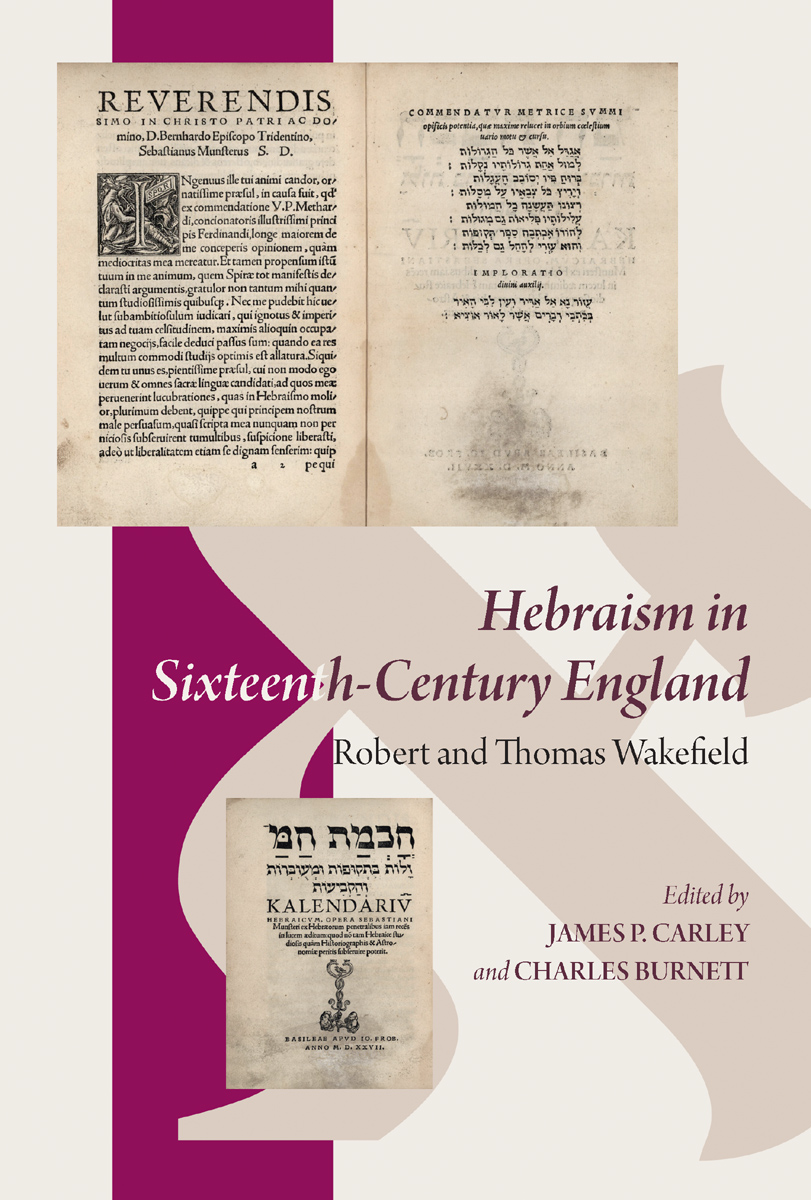
Hebraism in Sixteenth-Century England: Robert and Thomas Wakefield
Studies and Texts 231; Judaism in the Medieval and Early Modern World 3 • xvi, 332 pp. • ISBN 978-0-88844-231-4 • Cloth • $95
Robert Wakefield (ca. 1493/5–1537) and his brother Thomas (1500–1575) were pioneers in the study and teaching of Hebrew in early modern England, but the range of their learning and their accomplishments has received scant scholarly attention.
Robert was trained at Cambridge, where he was closely associated with the educational reforms of John Fisher. He claimed to have acquired his expertise in Aramaic, Hebrew, and Arabic through long study of books that had come into his hands rather than from teachers. By the 1520s, however, his erudition combined respectable biblical scholarship with knowledge of later Jewish literature, eventually bringing him professorial status in Louvain and in Cambridge, and later in Oxford.
Thomas, who enjoyed long tenure as praelector in Hebrew at Cambridge, took possession of his brother’s books and manuscripts upon his sudden death. Thomas was a compulsive annotator of his books, and through his notes it has been possible to learn a great deal about his intellectual, philological, and theological interests. His marginalia in a copy of the Hebrew Bible he inherited reveal an overwhelming desire to return to the pristine version of the text of scripture, the Hebraica veritas.
This volume draws together the political, linguistic, and bibliographical materials that shaped the careers of these two scholars, often serving to revise previous claims. The essays, while representing important contributions in their own right, also reflect on each other, extending arguments and drawing together thematic conjunctions to produce a compelling analysis of Hebrew learning in sixteenth-century England.
Editors
Charles Burnett, FBA, is Professor of Arabic/Islamic Influences in Europe at the Warburg Institute, University of London. His research has concentrated on the translations of Arabic texts into Latin in the Middle Ages, in the fields of philosophy, science, religion, and magic. Among his publications are The Introduction of Arabic Learning into England (1997), Arabic into Latin in the Middle Ages: The Translators and their Intellectual and Social Context (2009), Numerals and Arithmetic in the Middle Ages (2010), and The Great Introduction to Astrology by Abū Maʿšar (with Keiji Yamamoto and David Pingree, 2019).
James P. Carley, FRSC, is a Distinguished Research Fellow Emeritus at York University, Toronto, and a Fellow at the Pontifical Institute of Mediaeval Studies, Toronto. He has published extensively on Glastonbury abbey, on the Arthurian legends, and on the foundation of Lambeth Palace Library. His edition of The Libraries of King Henry VIII was published in 2000. His edition and translation of John Leland’s De uiris illustribus, assisted by Caroline Brett, was published in 2010.
Contents
List of Figures • ix
Abbreviations • xii
Preface • xv
1 James P. Carley and Charles Burnett • Introduction • 1
2 James P. Carley • Robert and Thomas Wakefield: A Biographical Sketch • 8
3 Jessica Crown • Robert Wakefield’s Inaugural Orations in Context • 34
4 Joanna Weinberg • The Remarkable Hebraism of Robert Wakefield • 50
5 Charles Burnett • Robert Wakefield and Arabic • 70
6 Richard Rex • Robert Wakefield and the King’s Great Matter • 86
7 Saverio Campanini • The “Ezra Scroll” of Bologna in the Crossfire of the Royal Divorce: John Fisher, Robert Wakefield and an Erased Text • 111
8 Judith Olszowy-Schlanger • “My Silent Teachers”: Hebrew Manuscripts as the Source of Robert Wakefield’s Hebraism • 132
9 James P. Carley • Robert Wakefield’s Manuscript Collections and the English Monastic Libraries: A Parallel to John Leland’s Mission • 167
10 James P. Carley • Books Owned or Annotated by the Wakefield Brothers • 180
11 Benjamin Williams • “Great Mountains Suspended from Every Single Letter”: Thomas Wakefield and His Hebrew Bibles • 198
12 Herbert L. Kessler • Thomas Wakefield’s “Antiquissimus Codex” and San Marco’s Musivum Novissimum • 237
Appendix 1 • David R. Carlson • Robert Wakefield, “Oratio Oxonii habita in Collegio Regio” (1532) • 271
Appendix 2 • Joanna Weinberg • A Hebrew Responsum about Levirate Marriage (1530) • 280
Bibliography • 287
Contributors • 313
Index of Manuscripts • 315
Indexes of Printed Books • 317
General Index • 323
Ordering
Customers in North America please order through University of Toronto Press Distribution by phone (1-800-565-9523) or by email (utpbooks@utpress.utoronto.ca). If you would like to order through UTP Distribution using another method such as mail or fax, please click here for a full list of contact and ordering methods. PIMS books are also available on Amazon.ca (for Canadian customers) and Amazon.com (for customers in the U.S.).
Customers outside North America please order through Brepols Publishers. PIMS books are available through the Brepols online catalogue.


